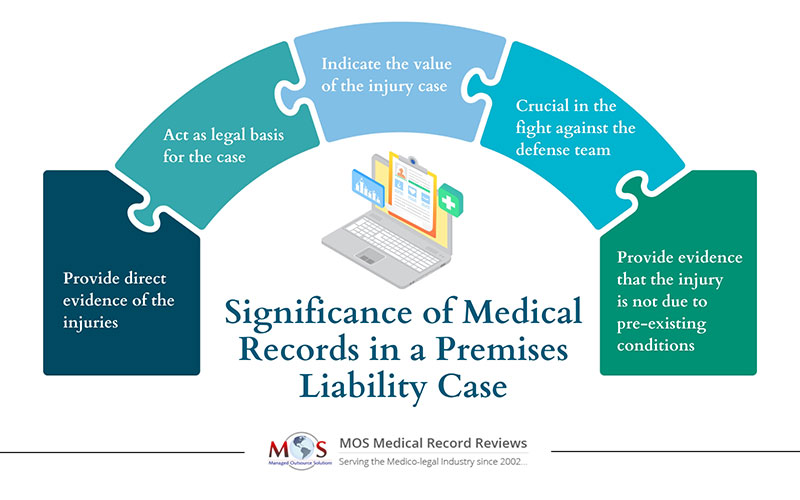A premises liability case involves an injury to a victim that is caused by a property owner’s negligence. In other words, it is a personal injury case wherein the injury is caused by an unsafe or defective condition on another person’s property. Negligence in this case means that the property owner did not use reasonable care in connection with the property. To recover compensation for the injuries sustained, premises liability medical record review and medical claims review are important considerations. The injured person or his/her attorney must prove that the property owner was negligent in spite of knowing that the premises were in a dangerous condition, and this resulted in the injury/harm to the plaintiff. To prove the nature and seriousness of the injury and its effect on the victim, evidence from the medical records is crucial.
MOS Medical Record Reviews provides customized medical review solutions for premises liability attorneys.
Give us a call for more details.
Medical Records and Medical Record Review Are Essential
Medical claims submitted to obtain financial compensation for injuries sustained depend on accurate documentation of the alleged injuries. Thus, medical records and medical claims review could be the most important factors of the personal injury claim. The medical records should corroborate the injury claim made by the plaintiff.
Important medical records include the following:
- Diagnostic records regarding the injuries sustained
- Ambulance, paramedic, ER treatment records
- Lab and other test results, X-rays, scans that prove the injury
- Medical reports or statements from treating physicians, medical specialists and consultants
- Physical therapy records
- Discharge summaries that contain prognosis and future treatment needs
- Bills and receipts related to the injury and treatments availed
Why Medical Records Are Very Important
Medical records show the timeline of the plaintiff’s injury, the costs involved in treating the injury, and the impact of the injury in the plaintiff’s life.
- Direct evidence of the injuries: ER records, diagnosis, doctors’ notes, prescribed treatment, and medical documentation of the pain experienced are all evidence. These documents help determine the recovery time involved and any future treatments that may be required.
- Evidence of damages: Medical records could act as the legal basis behind a Premises Liability or other type of personal injury case. They provide proof that the plaintiff was seriously injured.
- Medical records indicate the value of the injury case: With accurate medical records and medical bills, the actual price of surgeries and other treatments, hospital stays, rehabilitation, and prescriptions can be calculated.
- Important in the fight against the defense: The defense may conduct their own medical investigation. In such a scenario, having a complete medical record set is advantageous for the plaintiff because his/her attorney can build a stronger case for the claim.
- Evidence that the injuries are not due to pre-existing conditions: It is common for defense counsel to argue that the injuries, or pain and suffering of the victim stem from a pre-existing medical condition. The medical records can show that the plaintiff had no health issues before the accident. Also, even in the case of plaintiffs with some pre-existing health condition, statements from treating physicians can help establish that the injuries are new, or from the accident.
The attorney can use medical records to prove both economic and non-economic damages. Apart from tangible costs, the medical records will also contain records of intangible costs such as chronic pain and suffering.
Narrative Summary Services Highly Beneficial for Premises Liability Attorneys
Narrative summary services provide a clear narrative summary or a concise overview of complex medical data derived from the medical records. The key advantages these services offer include the following:
- Help streamline case analysis: When complex medical information is condensed into clear and concise summaries, attorneys can quickly understand the case, the timeline of events, and evidence.
- Help identify key issues: Lawyers can quickly understand key issues in a case including liability, negligence, damages and so on. This is essential to build a strong case.
- Improved communication: Accurate summaries help explain legal concepts and other case details to clients. This makes it easier for them to understand the case and the legal process.
- Aid in trial preparation: Narrative summaries can be used to develop good trial strategies. They also help identify weaknesses in the case and develop suitable arguments.
- Convincing documentation: These narratives can be used to support legal arguments and more easily present the case to judges and juries.
- Valuable time savings: Lawyers can save the time they would otherwise have to spend sifting through complex documentation. They can spend the time saved on case strategy and client interaction.
- Facilitates better collaboration: Narrative summaries help improve collaboration among the team members. They enable all team members to be on the same page regarding the details of the case and various strategies.
Types of Premises Liability Cases that Need Chart Review
- Slip and fall cases
- Inadequate maintenance of the premises
- Snow and ice accidents
- Defective conditions on the premises
- Dog bites
- Swimming pool accidents
- Elevator and escalator accidents
- Inadequate building security leading to injury
- Amusement park accidents
- Fires
- Floods/water leaks
- Chemicals or toxic fumes
Medical records contain the true facts regarding the personal injury and its impact on the plaintiff. They are accurate and quantifiable and are regarded as one of the strongest forms of legal evidence. Medical record summary services for attorneys is an important solution in this regard because it helps the attorney determine whether the case has value and can be effectively presented in court. Judges can benefit from the information contained in the medical records because it helps them determine how much the injury has affected the victim, and how it will continue to impact his or her future.
Get in touch with us for cutting-edge medical record review services.





